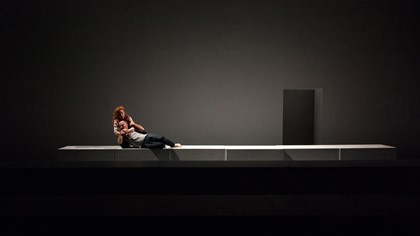Dramaturg Mark Pritchard speaks to the idea of a play as a hypothesis, and how theatre blurs the imaginary and the real.
In everyday life, ‘if’ is a fiction; in the theatre ‘if’ is an experiment.
In everyday life, ‘if’ is an evasion; in the theatre ‘if’ is the truth.
— Peter Brook, The Empty Space
Theatre is my thinking place. It’s where I go when I want to work something out. Whether it’s desire, mortality, conflict, heartache, corruption, or confusion, you can put on a play that's about that stuff, and use the tools of the form to work through a dilemma. Making theatre is both a creative act of imagination, and a genuine social process, in which a group of people come together and negotiate something real. And it’s that moment where you let yourself lose track of which is which—the confusion of the imaginary and the real—that makes it truly mind-expanding.
I’ve started thinking about plays as hypotheses. Declan Greene put this idea to me and I keep coming back to it. A writer proposes a theory of action, and the performers and creative team work together to test and refine this theory in real space and time. The approach might be completely fantastical, or clinical, or some other approach altogether to demonstrate some dynamic relationship between forces in the fiction.
The team develop their interpretation of it, rehashing and refining, with whatever tools are available. A stool stands in for a throne, an actor portrays a character, a shaft of light signals a summons to the afterlife. Naturalism has become our simplest metaphor, where the artistry is in making the stage picture mimic the world as we believe it to be. But the more incongruous the substitution, the further we push this disjuncture between the imaginary and the real, which might make us laugh, but might also help us destabilise what we think we’re looking at.
This process of play and investigation continues on stage, as the team act out the hypothesis live night after night. And we the audience get to sit in the same live space in which this process is happening—watching them work it out—as we try to locate ourselves in relation to the action. On one level we’re invisible observers of someone else’s dream, but we’re also flesh-and-blood people in the room with them, trying to use what’s been proposed to make better sense of our lives and how to live them. As Chekhov argued, theatre isn’t about giving answers—it’s helping us see the questions more clearly. And again there’s this duality: am I here or am I not?
There’s something about an artform that’s so resolutely analogue that I find incredibly clarifying. Theatre is difficult. It’s exposing, it’s rudimentary, it demands time, it demands people, and we have to do it together. And by being so difficult, it puts your ideas under this exquisite pressure: they have to stand up to scrutiny, hold our attention, and illicit our genuine personal investment. Paid or unpaid, good theatre is a labour that we bring our hearts to bear upon.
In the theatre you’re always going back to basics, trying to excavate some fundamental understanding of how theatre works and how people work. Over centuries we’ve learned a lot about how theatre works, but the rules are constantly changing, and with every production you strip back the theatre to its bones and start again. You take a blank page, a bare stage, and you and your collaborators work together to decide what to bring into this room on this particular project.
Peter Brook famously characterised the theatre as an empty space. While the stage might be stripped back, the theatre is never completely empty. It’s an institution, it’s full of hierarchies, history and biases, and it doesn’t operate in a vacuum. We might strive to come with fresh eyes, questioning our biases, to be open-minded recipients of each new hypothesis—but we’ve got our own tastes, our own desires, and our own baggage, and theatre has a way of bringing those out too. Theatre’s neutrality as a platform might be more of an aspiration than a given, and more and more we’re having to put the theatre itself on trial as part of our work.
As a form, I do believe theatre has space to consider anything.
It can expand to accommodate whatever challenges we choose to bring to it. When so much is happening in the world outside the theatre, we need new strategies to bring more of ourselves to the room, and let what’s difficult take centre stage. My challenge to theatre-makers now is to look past the familiar metaphors, challenge our expectations, and give us new ways of seeing what we think we know. We have to let our real experiences factor into the hypotheses we’re working with, and see where they lead us.
At its heart, theatre is about transformation. Of people. Of perspectives. Of worlds. Somehow, by surrendering ourselves to this entanglement of the imaginary and the real, we can fall into some unexpected vision of an impossible world, and look back at ourselves in the audience. Through theatre we can imagine ourselves being transformed—and it’s the potential for transformation in all of us that gives me hope.
Mark Pritchard is the New Work Manager at Malthouse Theatre. He first worked with the company through the Besen Family Artist Program in 2013, before joining the artistic team the following year. Mark oversees all our play commissions and new work in development.
